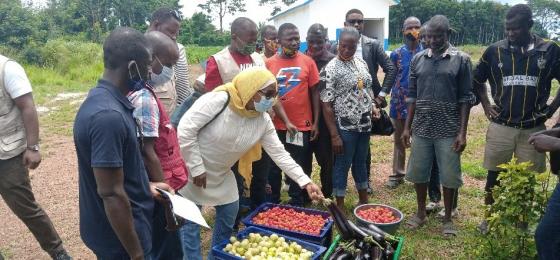UAE Funds Vegetable Farming in Nimba County

FAO Rep. Njie applauds Say No to Hunger Farmers for their harvest
-- As FAO pledges additional support to farmers’ cooperative
The Country Representative of the Food and Agriculture Organization (FAO) Mariatou Njie has informed vegetable farmers in Nimba County that the institution has secured funding from the United Arab Emirates for irrigation, storage, and market linkages support.
The goal, Ms. Njie explained, is to strengthen the value addition and marketing skills as well as production capacity of the group of farmers known as the “Say No to Hunger Farmers”.
Touring the group farm, which contains garden eggs and tomatoes on a 2.5 hectares of land in Welenah community, Nimba County, the FAO representative promised her institution sustained support in improving farmers vegetable farming techniques.
“The storage technology underway is called ‘Farm from Box’, given that it adds value to both vegetable and poultry produce, using an equipped container,” Ms. Njie added.
For his part, the Executive Director, Mr. Ezekiel Sayetee of “Say No to Hunger Farmers’’ applauded the FAO team for its tremendous inputs and technical support provided to them since 2019.
The project supported by FAO is titled: “Promoting increased resilience and sustainable income generation, food security, and nutrition for rural women.”
Mr. Sayetee added that as one of the twenty-six farmers cooperatives of the UAE funded project so far, they have benefitted from agronomic training on good agricultural/climate-smart practices, inputs (seeds, tools), management and marketing support, agro-machineries, extension and technical backstopping, amongst others.
Also present at the occasion was the chairman of a neighboring cooperative, Per-ta-luo Farmers Group, Joe S. Sehneah.
He expressed gratitude to FAO for the support his farmers’ group has received as well.
Sehneah, however, highlighted a couple of common challenges that they are faced with in the cultivation and management of their vegetable gardens. According to the farmers’ cooperatives, the challenges include limited irrigation facilities to water their gardens beyond the rainfalls to enable them to re-cultivate crops after the rains, pest control, difficulties in establishing farm-gate marketing of their crops, lack of storage and transport facilities of their vegetable produce.
In closing remarks, the Board Chairman of the Say No to Hunger Farmers, Dr. Mogana S. Flomo, Sr., applauded the FAO for supporting farmers groups especially the rural women, to learn improved agronomic practices, increase their resilience, and promote sustainable income generation, food security and nutrition.
The Chairman assured FAO of the sustained commitment of members of both Say No to Hunger farmers and Per-ta-luo Farmers Groups.
“Given these supports received so far, including those underway, I hereby urge our members to redouble their efforts to increase subsequent cultivation and harvest,” Dr. Flomo said.
According to FAO, they have for the first time introduced the integration of poultry and vegetable farming in the same space. Added to the technology for value addition are improved agronomic practices and agro-machinery. This model, which usually targets a minimum of five hectares – aims to boost local production, increase income and reduce food and nutrition insecurity.
Working in the bordering counties of Bong, Lofa, Nimba, and Gbarpolu, this model of commercialization holds great potential to increase and sustain export of products to neighboring communities in Guinea, Côte D’Ivoire, and Sierra Leone, when optimized.
